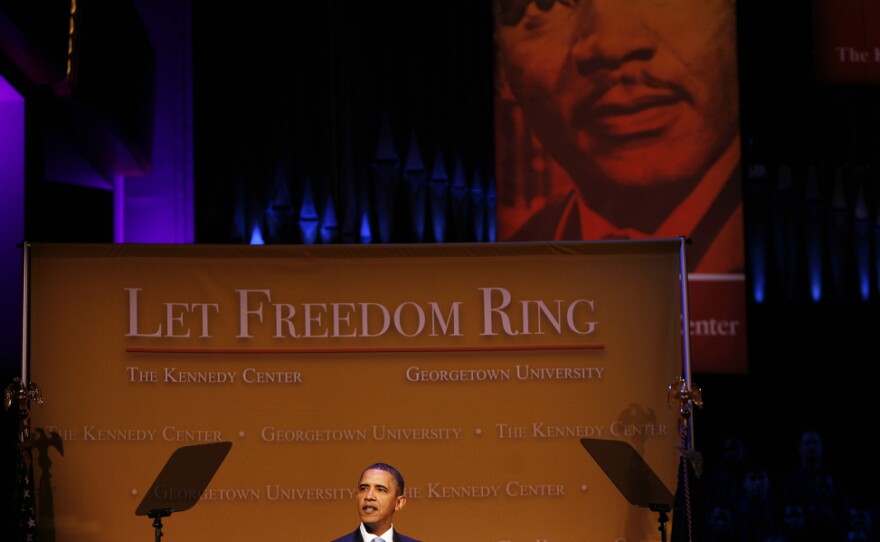President Obama is getting criticized from all sides lately, and the African-American community is no exception. In an op-ed piece in Friday's New York Times, Princeton professor Cornel West condemned the president for ignoring homeowners, workers and poor people and, instead, giving "us bailouts for banks, record profits for Wall Street and giant budget cuts on the backs of the vulnerable."
Members of the Congressional Black Caucus recently staged a jobs tour criticizing Obama for ignoring the plight of black communities. As Obama prepares to dedicate the memorial to Martin Luther King Jr. on the National Mall, many black leaders want to see the first black president of the United States do more to help their community.
In an NPR interview in July, Obama was asked whether he has a special responsibility to look out for the interests of African-Americans. "I have a special responsibility to look out for the interests of every American," he replied. "That's my job as president of the United States. And I wake up every morning trying to promote the kinds of policies that are going to make the biggest difference for the most number of people so that they can live out their American dream."
That answer is in keeping with this president's tendencies, says Harvard Law Professor Randall Kennedy, who wrote the new book The Persistence of the Color Line: Racial Politics and the Obama Presidency. "Barack Obama doesn't like to talk about race," says Kennedy. "There are some people who would say that with condemnation. I don't."
Kennedy argues that Obama became president of the United States by "overcoming his blackness. To be re-elected he will have to overcome his blackness. And so some of his enemies want to quite literally blacken Barack Obama."
I think we need more leadership from the president. He is a magnificent example of the progress that we have made. He is clearly well aware that he is in the legacy of what Dr. King was envisioning. And I hope he does act more proactively to bring us together.
Indeed, Obama has generally avoided talking about race until outside events force his hand. During the 2008 campaign, fiery sermons by the Rev. Jeremiah Wright pushed the issue of race to the fore. In Philadelphia, candidate Obama delivered a now-famous speech, saying the U.S. has been stuck in a racial stalemate for years.
"Talk show hosts and conservative commentators built entire careers unmasking bogus claims of racism while dismissing legitimate discussions of racial injustice and inequality as mere political correctness or reverse racism," he said.
But those discussions of racial injustice and inequality have not been a large part of this White House's public message. And the economy has made evidence of this inequality hard to ignore. The unemployment rate among blacks is 16 percent. Blacks are more likely to lose their homes to foreclosure than are whites. In education, the achievement gap persists. And prisons are overflowing with black men.
"So we see enormous problems that have to be addressed if we are going to be able to achieve what Dr. King was talking about, a more just, inclusive democracy," says John Payton, president of the NAACP Legal Defense and Educational Fund.
"I think we need more leadership from the president," says Payton. "He is a magnificent example of the progress that we have made. He is clearly well aware that he is in the legacy of what Dr. King was envisioning. And I hope he does act more proactively to bring us together."
The speech dedicating the King memorial, whenever it ultimately takes place, is an opportunity for the president to address those concerns even as he addresses the entire nation.
The site opened to the public Monday. Under a blue summer sky, visitors sat on low stone walls looking at the statue. Many people expressed the same sentiment about President Obama: Sure he's black, they said, but first and foremost he's the president of the United States.
"He was elected by the people, the same as all of the previous white presidents were," said L.H. Ruffin. "So I benefit or I lose based on everybody's benefiting or losing. It's not a matter of him being a president for me. It's a matter of him being a president that's going to make the situation better for all of us."
Or, to put it in the words of King, "We may have all come on different ships, but we're in the same boat now."
Copyright 2022 NPR. To see more, visit https://www.npr.org. 9(MDAzMjM2NDYzMDEyMzc1Njk5NjAxNzY3OQ001))







